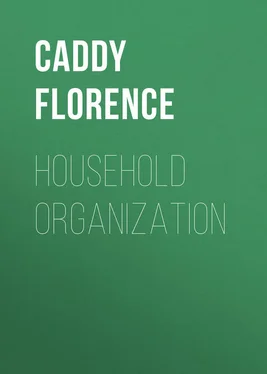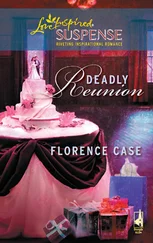Florence Caddy - Household Organization
Здесь есть возможность читать онлайн «Florence Caddy - Household Organization» — ознакомительный отрывок электронной книги совершенно бесплатно, а после прочтения отрывка купить полную версию. В некоторых случаях можно слушать аудио, скачать через торрент в формате fb2 и присутствует краткое содержание. ISBN: , Жанр: foreign_antique, foreign_prose, на английском языке. Описание произведения, (предисловие) а так же отзывы посетителей доступны на портале библиотеки ЛибКат.
- Название:Household Organization
- Автор:
- Жанр:
- Год:неизвестен
- ISBN:http://www.gutenberg.org/ebooks/34097
- Рейтинг книги:5 / 5. Голосов: 1
-
Избранное:Добавить в избранное
- Отзывы:
-
Ваша оценка:
- 100
- 1
- 2
- 3
- 4
- 5
Household Organization: краткое содержание, описание и аннотация
Предлагаем к чтению аннотацию, описание, краткое содержание или предисловие (зависит от того, что написал сам автор книги «Household Organization»). Если вы не нашли необходимую информацию о книге — напишите в комментариях, мы постараемся отыскать её.
Household Organization — читать онлайн ознакомительный отрывок
Ниже представлен текст книги, разбитый по страницам. Система сохранения места последней прочитанной страницы, позволяет с удобством читать онлайн бесплатно книгу «Household Organization», без необходимости каждый раз заново искать на чём Вы остановились. Поставьте закладку, и сможете в любой момент перейти на страницу, на которой закончили чтение.
Интервал:
Закладка:
We excuse young men from doing these things, instead of smoking or novel-reading through the whole of their spare time, on the plea that they work at money-making, forgetting that they do so for themselves, and not, like their father, for the family benefit. We might reform these things materially, and remove much of the self-indulgence which causes what has been truly called "the shame of mixed luxury and misery over our native land." If we all habitually gave less trouble, we should require fewer servants to wait upon us.
There is a scarcity of good working servants, while the governess market is largely over-stocked. How many thousand of the poorest subjects of our Queen are now sinking, sick with hope deferred, into despondence, hating the present, dreading the future.
And yet on all hands we hear our lady friends say, "We must all wait upon ourselves now." The impossibility of finding the average of three servants for every house in London being now recognized. Why need there be three servants to every house, when servants are the greatest drain to the fortune of a family, worse even than the dress and society of its lady members, or than the tobacco of the men?
With study, and application of modern inventions, the three servants might be reduced to two; the two-servant-power establishments might dispense with one; and in many families where only one servant is kept, a lady-help would be found more useful, as well as more ornamental, than the "dolly-mop."
Trade is bad, and many young women, such as lace-makers, seek service. But being of the lower orders does not necessarily make them efficient servants, not more so than young ladies who have never learnt household work.
The existing puzzle is how to utilize the lady-help, for we must always bear in mind that she is a lady. She must not be merely ornamental, nor may we expect her to do anything menial. And here we must distinguish – this indeed is the great point for distinction – what is menial and what is not, and then see if we can reduce the number of works considered menial.
When we read of Marie Antoinette's delightful playing at work at the Trianon, and think of her in her bewitching costume, her work, the work she supposed herself to be doing, is placed in the region of picturesque poetry; as Tennyson's gardener's daughter, training her wreaths over the porch, is as poetical a personage as his pensive Adeline or stately Eleonöre.
We hear that the daughters of Queen Victoria take pride in, and give personal attention to, their dairies, and love to work among their gardens and model farms. And the Prince Consort designed model cottages for the poor in which it would be bliss to dwell, only it is impracticable to make the poor endure novelties in domestic life. Why, then, should we alone think it improper, unlady-like, and what not, to study these every-day utilities, and plan improvements in sinks and boilers?
But things are not so bad as they were thirty and forty years ago, as regards what is lady-like and what is not. We are emancipated from the thraldom of its being considered genteel to be idle, and interesting to be helpless, unable to dress ourselves, or tie our own bonnet-strings without the assistance of our maid. In my young days we always had to wait for a maid to come and hook our dresses; we should not endure this now.
The favourite story of the Queen always putting away her own bonnet, and folding up the strings(!) helped much in sweeping away this fanciful gentility. Since the introduction of the sewing-machine, made as a piece of furniture fit for a lady's sitting-room, ladies have been less ashamed to be seen making their own dresses; and every girl now, of any pretension to taste, twists up her silk, tulle, and ribbons, mingling them in hats and bonnets with flowers or feathers, the most graceful objects in creation, until her skill produces a thing of beauty which is a joy throughout the summer.
What artist would desire a more charming subject for his picture than a pretty girl before her glass, trying in which position these delicate gauds best become the face they will adorn. It is holding nature up to the mirror. Yet some years ago girls were ashamed of a home-made bonnet, because their careful elders taught them it was more virtuous to make shirts than to cultivate their taste. The consequence was they were obliged to pay some guineas for a bonnet, as amateur millinery was a tissue of horrors.
The cooking-schools are helping us in another useful branch of housewifery. Here again woman's work is being raised out of the dulness of the "Berlin repository" into an atmosphere in which all the senses may revel. Smell and taste are here perfectly satisfied, and here we offer another picture for our imaginary artist – or perhaps the beholder may be a lover.
What more captivating sight than the girl of his heart deftly moving about among bright pots and kettles, and delicious bits of blue and other ware, gleaming among the copper stewpans? Dutch tiles all round the stove, and everything as picturesque as in a Friesland kitchen (which we admire enough to go a long way to see), and the young housewife in a fresh and prettily worked dress of Holland or cambric, made short, showing her red morocco shoes, her sleeves short to the elbow, with a dainty bib and apron to keep her dress from soil: she rolling out pastry at a marble table, having by her side a graceful ewer of water, or fanciful milk-pot, and, in neat arrangement, quaint jars for jams, and pails and tubs of the carved wood which is so artistically made by the Norwegian peasants. But I must fill up my outlines further on, as I enter into detail of each department of the house, and show how the first steps may be made easy in the direction of pleasant employment which shall be both useful and economical.
Do not look upon the taste and beauty of details as unimportant. They make up the harmony of our lives. Taste exercises a larger influence than we give it credit for. What makes Paris flourish? Why do we all enjoy it? Not for its Louvre galleries, nor for its intellectual life and culture most, but for its tasty shops!
We will speak of the house in the following order. First, the hall by which we enter it from the street; then we will bring our housewife into the kitchen, not necessarily, nor even advisably, downstairs, but near the entrance-door, so that the goods brought into the house need not have far to travel and be lifted (which would entail fatigue) before they reach the scene of their transmutation; the dining-room will come naturally next to the kitchen, as it should be nearest in a topographical sense.
Then we can adjourn to the withdrawing-room, and refresh ourselves with jardinière or conservatory before undertaking the arrangement of the bed-rooms and nurseries, where we pass so large a portion of our lives; and lastly, we will speak of the inhabitants, more particularly of the children. In considering the latter, we shall find the greatest benefit of anything I have recommended in this book, namely, that in place of the low-minded words and sentiments and vulgar habits of those who come nearest to ourselves in the society of our children, we may have a higher and purer association, so that the good of their future education will not have already been neutralized by corrupted early principles.
By interesting occupation our young ladies will have less time for sentimental troubles and fancied ill-health, which is nervousness. Eugénie de Guérin hit the mark when she wrote, "Yes; work, work! Keep busy the body, which does mischief to the soul! I have been so little occupied to-day, and that is bad for one, and it gives a certain ennui which I have in me time to ferment." On another occasion she speaks of having been writing and thinking, and then going back to her spinning-wheel or a book, or taking a saucepan, or playing with her dogs; and then she adds, "Such a life as this I call heaven upon earth."
Читать дальшеИнтервал:
Закладка:
Похожие книги на «Household Organization»
Представляем Вашему вниманию похожие книги на «Household Organization» списком для выбора. Мы отобрали схожую по названию и смыслу литературу в надежде предоставить читателям больше вариантов отыскать новые, интересные, ещё непрочитанные произведения.
Обсуждение, отзывы о книге «Household Organization» и просто собственные мнения читателей. Оставьте ваши комментарии, напишите, что Вы думаете о произведении, его смысле или главных героях. Укажите что конкретно понравилось, а что нет, и почему Вы так считаете.












